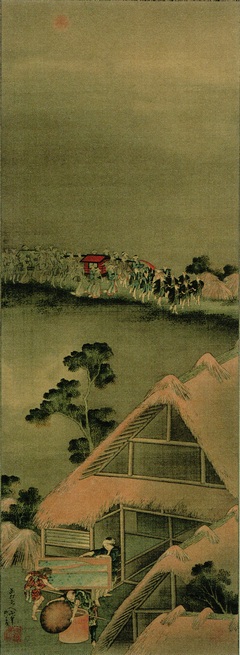Adding Insult to Animal
Which one of these things do you think is an insult?
a. bear on fire
b. firefly light
c. outward alligator
I'll block the answer with an image of animals. (And speaking of animals, my dog Kanji is now officially in remission!)

It's not easy to make out details in this image from Wikipedia, but it's a Hokusai woodblock print called 「狐の嫁入り (きつねのよめいり)」, and it depicts a group of foxes in a wedding procession. In the middle, the fox bride rides in a red palanquin.
The phrase 狐の嫁入り translates as "the foxes' wedding" and primarily means "rain shower while the sun shines." Superstition has it that when there's a rain shower during sunshine, one fox is marrying another. Why a fox? Well, they're famous in Japan for playing tricks on humans, just as Mother Nature screws with people's heads by producing rain and sunshine at the same time.
As Wikipedia notes, 狐の嫁入り can refer to several mysterious phenomena with lights, including ghostly lights that float in the darkness as if coming from a procession of lanterns.
The answer is that "b. firefly light" is the most insulting term of the three, but let's go in order.
By "bear on fire," I meant 熊 (くま: bear). As you can see, there are flames (灬) shooting out of the bear (or slowly roasting him from the ground). But perhaps it's more correct to say that because 熊 combines 能 (ノウ: talent) with 灬, it's really the talent that's on fire. In any case, there's no insult here. Just a hot bear with a lot of talent inside!
As for "firefly light," I was thinking of this term:
蛍光灯 (けいこうとう: (1) fluorescent lamp; fluorescent light; (2) person who is slow to react; someone slow on the uptake) firefly + light + lamp, light
This insult compares a slow reactor to a fluorescent light, as that device takes ages to flicker into action. What a brilliant insult! (Unfortunately, people no longer use it much today.) By the way, 蛍光 means "fluorescence," which means "emission of light from an object," to put it simplistically. How ingenious to connect this concept with the behavior of a firefly!
As long as we're talking about insects, check out this term, which flitted into essay 1846 on 娘 (daughter; young woman; girl):
虫が付く (むしがつく: to become infested with insects; have an unfavorable lover)
What an unexpected second definition!
Finally, with "outward alligator," I was alluding to this term (in which the second kanji is non-Joyo):
外鰐 (そとわに: walking with the feet pointing outward, frog-footed)
outward + alligator
Instead of "pigeon-toed" or "frog-footed" (an expression I've never heard), the Japanese say "outward alligator"! Now, do alligator legs actually point outward? Ah, I think it's more that they splay out to the sides, rather than that they point forward and out at a 45-degree angle. I suppose no one wants to be called pigeon-toed, frog-footed, or alligator-legged, but this is not an insult, strictly speaking.
By the way, if you want to access the "zoo hiding inside Japanese word processors," check out a fun article from RocketNews24. It teaches you how to "type art" using Japanese words as your "palette."
Have a great weekend!

Comments